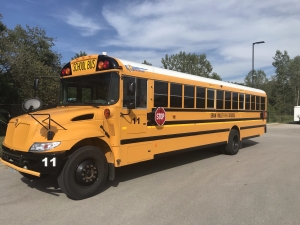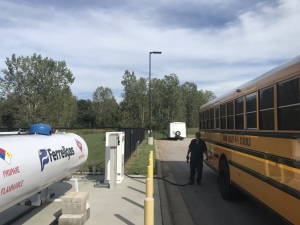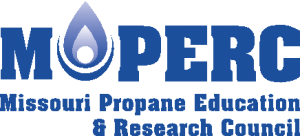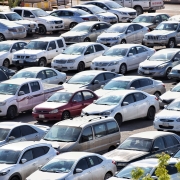Carnage in the conventional energy sector has drawn a lot of attention in the past few weeks. But the collapse of recent months was presaged by mediocre performance stretching back literally years. Total returns for the Standard & Poor Energy Sector for 2019, including dividends, were a paltry 6%. And for the entire decade of 2010-2019, the same sector was up 34%, by far the worst performance of the 11 sectors S&P tracks. The fracking revolution, it turns out, created a world awash in oil and gas, but didn’t do much to help the industry that created it.
Which brings us to a related question – if oil & gas are in trouble from COVID-19 and from a decade of overproduction and low prices, what has the ongoing turmoil done to alternative fuels? In particular, since KC Clean Cities operates in the biofueled, beating heart of the Midwest, what’s happened to biodiesel and (particularly) ethanol?
A bit of backstory: more than 95% of vehicle gasoline sold in the US is a 10% ethanol blend. There are several reasons for this. Until about 15 years ago, a compound known as MTBE (methyl tertiary-butyl ether) was blended with gasoline to add oxygen. As a result, gasoline burned cleaner, and cut smog-forming chemicals and toxins like benzene in exhaust. But there were problems – MTBE leaked into groundwater from gas station tanks, creating water quality problems. Moreover, it’s listed as a potential carcinogen. Enter ethanol, exit MTBE with the Energy Policy Act of 2005.
Like MTBE, ethanol adds oxygen to gasoline and cuts smog-forming emissions. Unlike MTBE, it’s also a way for America to deal with its massive agricultural surpluses by distilling a value-added product from corn. (It’s worth noting that ethanol now accounts for 40% of all the corn we grow.)
With the Energy Independence & Security Act of 2007, Congress created a mandate that steadily increasing amounts of renewables would be blended into America’s fuel supply – 36 billion gallons by 2022. This is the Renewable Fuels Standard, which has been hotly debated over the last few years in Washington and elsewhere.
So far so good. Refineries and fuel importers had a choice – they could blend steadily increasing amounts of renewable fuels. Or, if they didn’t want to, they could use RINs – Renewable Inventory Numbers – attached to each gallon of renewable fuel produced. Pecos Pete’s refinery has already hit their required volume of ethanol blended with gasoline for the year, but they keep on blending. Why? Because Brownsville Bob’s refinery hasn’t blended any ethanol into their gasoline. However, Bob can stay in compliance by buying RINs from Pecos Pete, with the price set by the RIN market.
There’s also been a safety valve built into the system, called the Small Refinery Exemption or SRE. “Small” is relative, but refineries with less than 75,000 barrels per day as of 2006 qualify, and can petition EPA to be excused from renewable fuel blending. And this is where the fur begins to fly. Between 2016 and 2018, the EPA granted a total of 85 small refinery exemptions, a big jump that removed a total of 4 billion gallons of mandated demand from the market. This has been a sore spot with farmers, but hardly the only one. The ongoing trade war with China has dried up what was a major market for ethanol, corn and distiller’s grain, a byproduct of the ethanol production process used as animal feed. Allowing year-round sales of E-15 – that is, gasoline that is 15% ethanol by volume hasn’t made much of a dent, since relatively few gas stations sell it even though all light-duty gasoline vehicles 2001 or newer are approved to use E15.
And now, COVID. Just as Texas and Oklahoma oil producers and refineries don’t have any place left to store their crude and refined products as consumer demand collapses, ethanol producers are running out of storage. Federal Reserve research shows US ethanol production down nearly 50% since the beginning of 2020. 73 out of 200 total plants nationwide are shut down, while another 71 are on reduced production schedules. At least two dozen ethanol plants are now producing alcohol for hand sanitizer, but at low volume, much of which will be donated anyway.
For the time being, the sector seems to be shaking its way into stasis. Whatever shape the ethanol industry takes in 2021 and beyond will depend for now on what the virus does– and how we respond – in 2020.
For additional details on why this matters, please check out our guest blog posting by David VanderGriend of the Urban Air Institute. Fuel blending standards can sound arcane, and the details of ethanol and corn and agriculture seem like something taking place in distant, rural counties. They’re not. They impact the lives of residents of metro Kansas City every day, and at the fundamental level of our own health.
Written by David VanderGriend – This post also appeared in the Kansas City Star
A startling reality has surfaced from the coronavirus health crisis: Pollution has been significantly reduced in recent weeks during the shutdown. Whether in New Delhi, Kansas City, New York, or Beijing, less driving has resulted in cleaner air. Vistas that previously were only foggy images have burst through as crystal clear pictures of what clean air actually looks like. If we thought we were cleaning the air before, we now see we can do better.
The fact that reduced driving equates to reduced pollution is not a surprise to many of us in the fuel business who have studied and understand the negative aspects of our reliance on petroleum alone. And it relates to a second disturbing reality: Minority communities are disproportionately contracting COVID 19 because of the poor air quality resulting from the traffic congestion of the inner cities.
In establishing the Urban Air Initiative, our objective was to improve fuel quality, while recognizing that eliminating the internal combustion engine is neither an immediate nor practical strategy to reducing pollution. With more than 260 million cars registered in the U.S., we will continue to rely on gasoline for the foreseeable future — but we can identify the most harmful components of gasoline and replace them. Ethanol, for example, is a superior substitute for the family of benzene octane gas additives that produce microscopic particulates and are linked to a range of respiratory and other ailments.
In naming our organization the Urban Air Initiative, we did so knowing urban areas are disproportionately subject to harmful auto emissions, and that they are where the most help is needed.
And who lives in urban areas? The very minority groups feeling the brunt of the coronavirus crisis. New York City reports that inner city minorities are experiencing the highest fatalities from COVID-19, and Midwest cities such as Chicago and Milwaukee are similarly affected. So an obvious question is whether these people were predisposed to getting sick by virtue of simply living in urban areas. Our research has always suggested that is the case, but a new study from the Harvard School of Public Health is one of many research efforts that come to this conclusion.
The most important finding of the study is that people living in counties in the U.S. that have experienced a higher level of air pollution as measured by the Environmental Protection Agency over the past 15 to 17 years have a substantially higher COVID-19 mortality rate. And we believe pollution is much, much worse than what the EPA measures. Particulates associated with coal fired power plants or diesel fuel are just part of the story. Much smaller “ultra-fine” particulates that are literally microscopic are essentially unregulated and unreported.
In our correspondence with the EPA, the agency has conceded its modeling fails to capture these tiny particles and their precursors. It has long been understood that fine particulates linger in the air and travel great distances, with data showing anyone within 300 yards of a congested roadway is exposed. Now imagine the impact in an urban area, be it midsize Kansas City or mega-size New York, where pedestrians are within mere feet of automobiles on every corner and tall buildings trap the emissions. Now enters the coronavirus, attacking the same respiratory system that has long been compromised by near-roadway exposure.
The Harvard study pulls no punches in coming to its conclusions: “The majority of the pre-existing conditions that increase the risk of death for COVID-19 are the same diseases that are affected by long-term exposure to air pollution. … The study results underscore the importance of continuing to enforce existing air pollution regulations to protect human health both during and after the COVID-19 crisis.”
The takeaway here is that this is of course a nationwide problem, but it is most concentrated in our cities. All Americans — minority or not — need to understand they were already at risk, and will continue to be until we reduce emissions and improve our fuels.
David VanderGriend is president of the 501(c)(4) nonprofit Urban Air Initiative in Colwich, Kansas. Urban Air Initiative is a member of MEC.
As we all shift our routines in an effort to stay safe and healthy in light of the COVID-19 pandemic, Metropolitan Energy Center is exploring ways to adjust to the new normal. We want you to know we share the collective confusion and frustration of our friends, neighbors, and colleagues. Please remember we are all in this together. Be patient, be kind. And if you need us, we’ll be here, because we have been for over 35 years.
What We’re Doing
As the situation evolves, we are continually adjusting our response. At this time, our dedicated staff are working from home, in consideration of the CDC recommendations and in compliance with the KC Metro stay-at-home order, effective Tuesday, March 25. We are finding innovative ways to support our communities and continue our technical support for regional alternative fuels and energy efficiency advancements.
Staff can best be reached by email, though phone calls are still welcome and will be routed to the appropriate staff as soon as possible on the day the calls are received.
For scheduled meetings and events:
- All in-person meetings and events for the next 8 weeks are postponed, moved online, or cancelled.
- Scheduled conference calls will go on and will now offer a web connection in case you are unable to join through a phone connection.
For projects and project deliverables:
- Staff are conducting a COVID-19 risk assessment for all ongoing projects. If you are involved in a project and believe restrictions due to the crisis present a risk to you meeting your objectives, please notify your MEC staff contact immediately.
Hidden Costs and Silver Linings
This pandemic is something new for nearly all of us. Some Americans—those 75 and older—will remember the polio epidemic of the 1940s and 1950s. But for most of us, this means making changes in the ways we work, live and travel that we’ve never experienced before.
If there’s any sort of silver lining to this situation, it’s that finding new ways to work and move in the next months may lead to longer-term solutions that can improve health outcomes for everyone. COVID-19 is a respiratory illness, and good respiratory health is critical—now, in dealing with this disease, and for our community’s overall health in the future. MEC has worked for decades to cut toxic emissions with energy efficiency, cleaner fuels, intelligent transportation and building systems, and a cleaner, more efficient freight network. This work continues, with our diverse community and stakeholders in mind, and is more critical today than at any other point in history.
What You Can Do
#StayHomeKC. On March 21, elected officials in Jackson, Johnson and Wyandotte counties and the city of Kansas City, Missouri, announced a 30-day stay-at-home order. Other counties in the region have enacted various restrictions to help slow the spread of COVID-19. State and local guidelines are changing rapidly as more cases are confirmed.
For the latest information, check your local health department or city/county websites.
If you should venture away from home, please remember: exhaust irritates lungs. For the sake of those experiencing respiratory difficulty, turn off your engine if you will be waiting for a friend carpooling with you, for car-side delivery service, etc.
Take advantage of your reduced commute time to get outdoors more. Biking, walking and hiking can be done alone, with your pets, or in small groups adhering to social distancing practices.
Some outdoor volunteering opportunities may continue, in small groups adhering to social distancing practices, especially orgs doing wildland management, gardening and cultivation, tree planting, and the like. Carefully evaluate your host’s safety and health policies and practices before signing up. Due to the stay-at-home order, many of these events may be cancelled as well, so contact your host to confirm before showing up.
If you’re a volunteer and miss in-person group volunteering events, stay engaged through GlobalGiving. GlobalGiving’s virtual skilled volunteering platform, GlobalGivingTime, can match you with interesting opportunities from vetted nonprofits around the world, from the convenience of your desk.
Stay Informed
Metro KC officials are keeping PrepareMetroKC.org updated as new information becomes available.
As you know, this situation is continually shifting. We will monitor developments to adhere to federal, state and local advisories, and support the region’s efforts to protect the health and safety of the public.
Section 127(s) of Title 23 of the United States Code, as amended by the Consolidated Appropriations Act of 2019 (PL 116-6), increases the weight limit for natural gas vehicles operating on the interstate Highway System by an extra 2,000 lbs. This increases the limit from 80,000 lbs to 82,000 lbs.
Federal Highway Administration issued a departmental memorandum providing further guidance for this weight allowance.
FHWA Guidance includes the following:
- State authorities must allow the additional weight on the Interstate Highway System.
- State authorities must provide reasonable access to the Interstate.
- Weight allowance applies beyond the Gross Vehicle Weight (extends to single axel, tandem axel and bridge weight formulas limits).
- Weight allowance must be taken in addition to other weight allowances.
Follow this link below to access the full PDF provided by NVGAmerica. https://www.ngvamerica.org/wp-content/uploads/2020/01/NGV-Weight-Allowance-Guidance.pdf
District: Grain Valley School District
Industry: Education
Location: Grain Valley, Missouri
Vehicles: (14) 2018 IC Bus CE Series propane autogas-fueled buses
Fueling: On-site propane autogas station
Challenge
With aging diesel buses to replace, a Missouri school district looked to alternative fuel options that would save money on fuel and maintenance.
Result
The Grain Valley School District purchased 14 propane school buses. The new buses joined a 49-bus fleet that transports 2,800 students to school from subur ban and exurban neighborhoods.
ban and exurban neighborhoods.
Focus on Cost-Cutting
Over the years Missouri state reimbursements for school transportation have dropped from 75 percent to 16 to 20 percent. School districts in the state have had to tap their own general school funds to make up the shortfall.
To help save money, the Grain Valley district considered alternative fuels for its new school buses and comparing compressed natural gas (CNG) and propane autogas. District representatives attended an alternative fuels workshop hosted by Kansas City Regional Clean Cities, a Metropolitan Energy Center program. The district considered various fuels but “the vehicle costs and fueling station costs for CNG were much higher versus propane,” said Shawn Brady, director of transportation.
The district decided to purchase 14 propane buses in 2018 to replace diesel buses of 2001 and 2002 model years. Brady researched and applied for a grant from the U.S. Department of Energy through Kansas City Regional Clean Cities to assist with the purchase costs of the buses.
Preparing for Propane Autogas
To fuel the new buses, the district entered into a contract with their local propane provider, Ferrellgas. A fueling station with two 1,000-gallon tanks was built in the school district’s bus parking lot in April 2018. “It saves time not to have to travel to refuel,” Brady noted.
Infrastructure costs for propane are the lowest of any fuel; alternative or conventional. For Grain Valley schools, the start-up cost for the fueling station totaled $16,500. “We received a 45 percent grant from Metropolitan Energy Center for the installation of our propane fueling station,” Brady said. The center’s grant amounted to $7,425. “The fueling station cost us only $9,075 after the grant.”
Before putting the new buses on the district’s routes, drivers received training in propane bus operation. “Our bus vendor provided training on how to properly operate the buses and maximize fuel efficiency,” Brady said. The district’s technicians traveled to the bus manufacturer’s factory in Tulsa, Oklahoma, for a complimentary week-long training course on maintenance. The district didn’t need to make changes to its bus repair facility. Requirements for a propane vehicle service facility are generally the same as those for conventionally fueled vehicles.
Financial Benefits
After tapping grants for purchase assistance, each new bus cost about $250 more than a comparable diesel bus. District officials say that the higher initial cost can be quickly recouped in fuel savings.
In fact, by adding propane buses to its fleet, Grain Valley School District has noted savings on both fuel and maintenance. On average, propane autogas costs up to 50 percent less than diesel. As part of its  negotiated contract, Grain Valley paid a locked-in rate of $1.20 per gallon of propane in 2018-1019. For the 2019-2020 school year, the district pays $1.15 per gallon. For comparison, the district pays $2.31 per gallon on average for diesel.
negotiated contract, Grain Valley paid a locked-in rate of $1.20 per gallon of propane in 2018-1019. For the 2019-2020 school year, the district pays $1.15 per gallon. For comparison, the district pays $2.31 per gallon on average for diesel.
Each bus in the district runs about 9,000 miles per year. For the 2018-2019 school year, fuel savings amounted to about $14,500. “The district’s increased savings year after year will allow the transportation department to serve as a better steward of taxpayer money,” said Brady.
Additional savings come from the reduced maintenance. With propane autogas, no exhaust after-treatment or diesel emissions fluids are required like with diesel to meet today’s strict emissions regulations. Propane vehicles don’t need particulate trap systems, turbochargers and intercoolers. Plus, propane uses less engine oil. All these factors contribute to the overall savings of time and money. The district’s technicians like the propane buses, Brady reports. “There are fewer parts and systems to have to maintain.”
However, Brady explained that “warranty work is challenging with no established shop in Kansas City.” He noted that IC does provide a traveling technician who assists his staff when they encounter maintenance issues. Kansas City Regional Clean Cities recommends fleet managers ensure that there is a local service shop to do warranty and continuing work on buses before purchasing.
Even more saving shows up for the district in the winter. Due to the chemical properties of propane autogas, the propane buses warm up faster and have no cold start issues. Unlike diesel vehicles, these buses can start up in temperatures as low as -40 degrees Fahrenheit. School districts report lower electric costs because the propane buses don’t rely on block heaters. “Our propane buses warmed up faster this past winter than the diesel buses,” Brady said.
Beyond the Bottom Line
Grain Valley’s propane buses are helping the community’s air quality. Unlike diesel buses, propane vehicles emit virtually no particulate matter and, with substantially less nitrogen oxides (NOx). Buses fueled by propane also emit fewer greenhouse gases and total hydrocarbon emissions when compared to diesel buses. Propane’s quiet operation makes riding the bus more pleasant for passengers and safer for drivers, who are less distracted by engine noise. “We’ve benefitted from much cleaner air and much quieter buses running through neighborhoods,” said Brady.
Drivers also report that the propane dispenser pumps are just as fast or faster than the diesel fuel pump when it’s time to fill the tank. The district notes that it will be sure to order buses with 100-gallon fuel tanks going forward. “These were not available from IC when we placed our first order,” Brady said.
The district’s leadership in adopting an alternative fuel earned it a 2018 Agent of Change Award from the Metropolitan Energy Center, a Kansas City nonprofit catalyst for energy efficiency, economic development and environmental vitality.
The district’s plan to purchase seven more propane buses this year, and eventually move to an all-propane fleet, speaks to the administration’s belief in the benefits of this alternative fuel for their students, drivers and overall community.
“Our district made the decision on propane buses to save money. The environmental impact is an added benefit. There’s no reason to not make the move into propane now,” Brady said.

About MOPERC: The Missouri Propane Education & Research Council is a not-for-profit organization authorized by the Missouri Legislature. Dedicated to propane education and public awareness, MOPERC provides industry training, consumer safety, appliance rebates and market development programs. The council is composed of 15 volunteer directors and adm inistered by an executive staff. Visit PropaneMissouri.com.
About Us
Metropolitan Energy Center (MEC) is a 501(c)(3) nonprofit organization. Our mission is to create resource efficiency, environmental health, and economic vitality in the Kansas City region – and beyond. Learn more about us and our programs.

